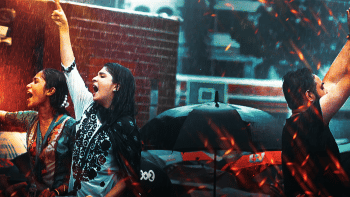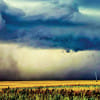What can songs do? A lot, actually! They can win hearts and also aid in unsettling an entire system and dethroning the powerful. We have been reminded of the latter during the recent student protests and a powerful reminder it was as the Gen Z of Bangladesh took old, patriotic songs and used them in a modern context. The youth took the songs to the streets and on social media, finding motivation in the lyrics and unity in the melodies.
If Nazrul was alive today…
He would possibly be a rockstar! As a man who had fought oppression in his times, he would, most likely, also be proud of this generation.
Why a rockstar, though?
I see him not just as a poet or lyricist championing freedom but also as a rebel with his signature style — a romantic, a bohemian who did not care to live by society's rules and dare I say, a "content creator" who understood the pulse of the masses and knew how to resonate with it — all ingredients of a rockstar.
Nazrul was also very modern. "Timeless" is perhaps a more apt word. No matter the medium, "Karar Oi Louho Kopat" will be present as long as there are "those iron walls of prison" in society. We have all seen new videos and reels of "Chol Chol Chol" in the past few weeks, on YouTube and Facebook, featuring many electrifying images from the protest — Abu Sayed's brave stand, the fearless marching of students, and so on.
And Nazrul's songs fit perfectly well!
Songs of Liberation: Radio 2.0
Many people have hailed the recent protests as a liberation movement of sorts, in pursuit of "Bangladesh 2.0". Therefore, it comes as no surprise that in the 2024 protests, we heard some of the same songs our previous generations and freedom fighters listened to in 1971.
Back in the day, we could imagine people huddled around the radio, getting inspired by the songs of freedom. Cut to the present time, social media have become the new platform for old songs. Social media is Radio 2.0!
Students on the streets sang "Teer Hara Ei Dheuer Shagor". What song could be more appropriate? It admits to a feeling of helplessness during an arduous voyage in a turbulent sea, whilst vowing to never give up and to brave the journey.
The metaphors of the songs of '71 have always amused me, and so do the melodies. The metaphors are appropriate, yet, not beyond the grasp of the common man. The melodies are arguably easy in the sense that people can sing along and once hooked, they keep on playing in our minds.
When everyone was changing their profile picture to red, the song "Purbo digonte shurjo utheche/Rokhto laal rokto laal rokto laal" was constantly playing in my head as well as on my speakers.
Songs beyond borders
Sure, we all saw those breathtaking reels featuring the protests of expatriates that took place abroad. Those reels too, used the likes of the aforementioned songs, making them even more captivating.
The endless scrolling most of us did during the times of protests has shown us even more. A couple of foreign songs were rediscovered and repackaged with new context and visuals: "They Don't Care About Us" became the sentiment when protests were met with brutality, and "Wavin' Flag" gave hope for a better tomorrow.

Not a just song, but a whole emotion
"Dhono Dhanno Pushpe Bhora" — the soulful melody and the heartfelt lyrics make us fall in love with our country again and again, and it has found its way to this generation and the recent struggle.
Unlike many songs we have sung or listened to during these trying times, this one is not exactly what you would call "blood-boiling". It does not make your pulse race. In short, it is not "aggressive", for lack of a better word.
Rather, strangely, I feel that it is a song of contemplation -- finding solace in the motherland, celebrating its beauty, and essentially declaring our love for this country. When sung together, it has the power to unite people and to give a common purpose.
Together with many other patriotic songs that have echoed through the corridors of the past, they have teamed up to add momentum to the recent uprising and made a government fall.
Old patriotic songs in a way are weapons passed down from one generation to the next. Sometimes, the blades may get a little rusty, until a generation rises, dusts off and re-sharpens them — ready to take on their demands forward and become an unstoppable force.
Views expressed in this article are the author's own.









Comments